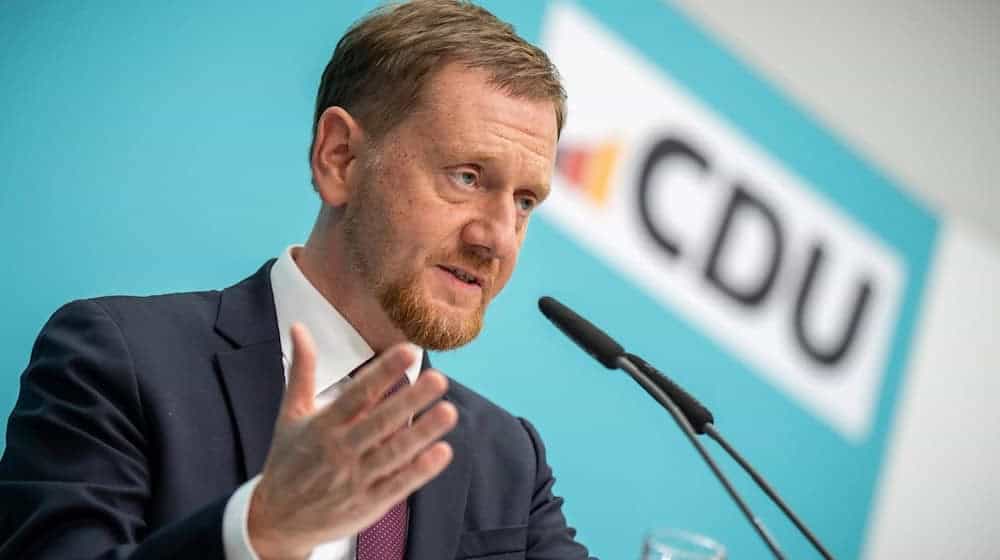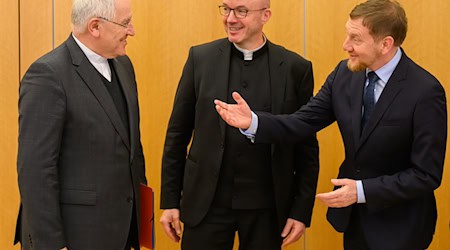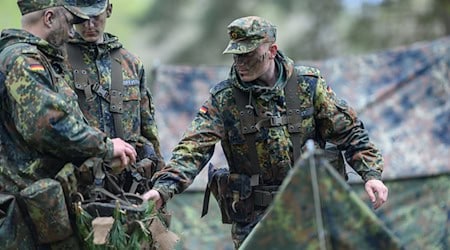The CDU, the Sahra Wagenknecht Alliance (BSW) and the SPD held initial talks until October 16, 2024, which resulted in an outcome paper. The purpose of these meetings was to sound out the parties' positions and determine whether potential cooperation in the Free State of Saxony is a possibility. Minister President Michael Kretschmer, whose CDU narrowly achieved a majority in the state elections with 31.9% ahead of the AfD (30.6%), described the talks as intensive and constructive. A key points paper now forms the basis for further steps, with the CDU currently in talks with the BSW (11.8 per cent) and the SPD (7.3 per cent) to form a stable government.
The following summarizes the central topics of the talks:
Migration, integration and security
Migration policy was a central topic in the talks. All parties are committed to the fundamental right to asylum, but want to effectively limit irregular migration. There is agreement on promoting the integration of people with the right to stay and at the same time speeding up the return of people who are required to leave the country. The parties attach particular importance to easing the burden on local authorities, which are under increasing pressure.
However, the use of benefits in kind instead of cash benefits for asylum seekers and the introduction of border police remain controversial. A tightening of police powers, such as source telecommunications surveillance, is also controversial. While the CDU and BSW are calling for stricter controls, the SPD is advocating a more balanced approach.
Economy and employment
The parties agree that Saxony must maintain its position as an industrial location and at the same time make it fit for the future. The social market economy is regarded by all as the basis for prosperity and social cohesion. The focus is on promoting skilled workers by facilitating immigration and faster recognition of foreign qualifications.
The issue of collective bargaining remains controversial. While the SPD is pushing for collective agreements to be strengthened in order to reduce wage differences between East and West and between women and men, the CDU and BSW see less need for action here. An initiative to increase the minimum wage is also on the table, which the SPD in particular is calling for.
Education and daycare
Another key topic of the talks was education. The acute shortage of teachers in Saxony is one of the biggest challenges, and the parties are planning increased measures to recruit teachers and more flexible deployment options. The relief of teachers through multi-professional teams is also to be promoted.
There is still a need for discussion when it comes to the digitalization of schools. The use of digital devices in elementary school is particularly controversial. Another controversial topic is the introduction of three-form entry comprehensive schools, which is supported by the SPD but rejected by the CDU and BSW.
Finances
In view of stagnating tax revenues and Germany's difficult economic situation, there is agreement that Saxony must pursue a sound financial policy in the coming years. All three parties agree that investing in the future and relieving the burden on local authorities are key priorities.
In order to create the financial scope for investment, the allocation to the generation fund is to be reviewed and used for investment if necessary. The question of whether Saxony should establish a state housing construction company to specifically promote the creation of housing remains controversial. While the SPD and BSW are in favor of this, the CDU does not see this as a central starting point.
Health and care
In the health sector, there is agreement that medical care must be ensured across the board. More incentives are to be created for doctors to settle in rural areas in particular. The parties also want to drive forward new forms of care and better financial support for family carers.
The introduction of a state care law and the establishment of a state health authority, which the SPD in particular is calling for, remain controversial.
Reducing bureaucracy
All parties want to drive forward the reduction of bureaucracy in Saxony. A central element is the digitalization of administrative processes and the simplification of approval procedures. A central point of contact for citizens is also to be created in order to minimize bureaucratic hurdles.
The administration is also to use more discretionary powers to speed up procedures for applicants. This should reduce the bureaucratic burden for companies and citizens.
Differences between talks, exploratory talks and coalition negotiations
The talks between the CDU, BSW and SPD to date have been so-called familiarization talks. They serve to explore the basic positions of the parties and to examine whether cooperation would be possible. No concrete agreements are made at this stage, but the parties explore their similarities and differences.
Sounding talks are the next step and are more formal in nature. These talks systematically examine whether the formation of a government is realistic and under what conditions it could take place. If the exploratory talks are successful, the parties decide to enter into coalition negotiations.
Coalition negotiations are the final step. This is where concrete agreements for government work are made. Issues such as the distribution of ministerial posts, the structure of programs and the budget are negotiated in detail and set out in a coalition agreement.
Conclusion and outlook
The talks have shown that cooperation between the CDU, BSW and SPD is possible in principle, even if many questions remain unanswered. Whether exploratory talks will take place will be decided in the coming weeks after the parties have deliberated in their committees.
For the citizens of Saxony, these talks could mean a new political constellation capable of tackling the state's most pressing problems. The coming weeks will show whether a stable coalition can be formed.
Background: Exploratory talks are formal meetings between parties to examine whether a coalition is possible. Only if these are successful will coalition negotiations follow, in which concrete agreements for government work are made.
The CDU narrowly achieved a majority in the state elections with 31.9%, followed by the AfD with 30.6%. The Sahra Wagenknecht alliance achieved 11.8 percent and the SPD 7.3 percent. In view of this election result, the CDU is currently in talks with potential coalition partners in order to form a viable government.










